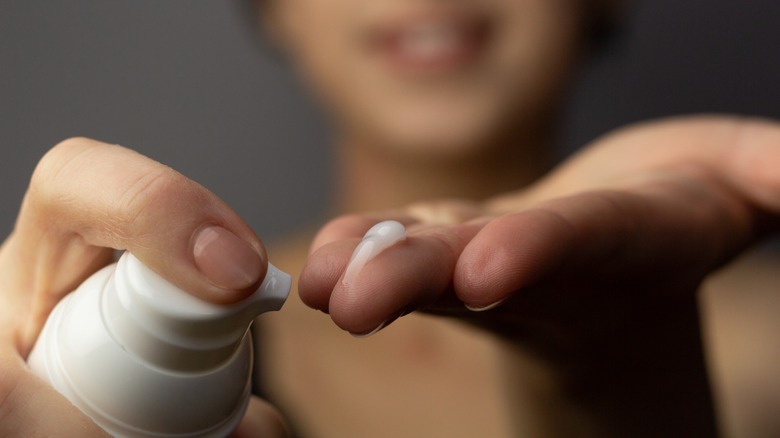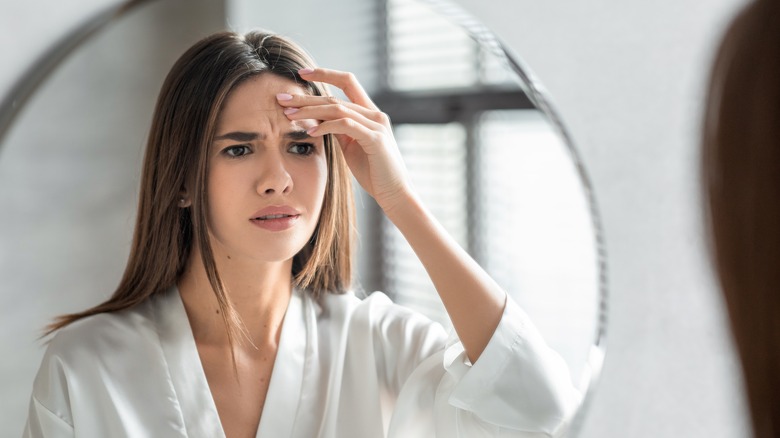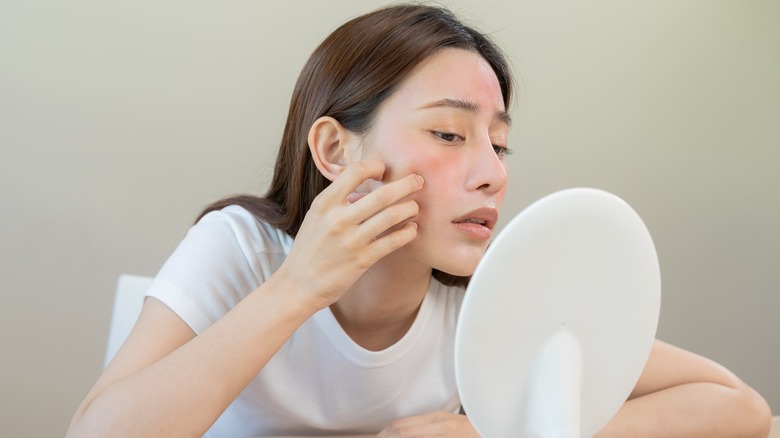The Retinol Myth You Should Stop Believing
Have you ever walked by the drugstore and seen a product you've had your eye on for a few months, strolled in, picked it up, and put it back down because you weren't sure if your assessment of the ingredients was accurate? It can be incredibly overwhelming and often frustrating when the internet throws a slew of information your way about skincare or beauty products, most of which is confusing. You're left wondering what you should believe and if any product out there is even good enough for you.
In general, retinol has a decent reputation. Even though retinol has enjoyed major and consistent demand in the skincare world, per Medical News Today, it's had a bumpy ride to this point, owing predominantly to the many misconceptions surrounding its use and effects. Retinol and retinoids both come from vitamin A, but the difference between the two lies in the strength of the ingredient, as the Cleveland Clinic explains.
Retinol typically comes in over-the-counter products — serums, creams, etc. — which are used to fight acne and signs of premature aging including wrinkles and fine lines. Retinoids are a more potent version of vitamin A for which you'll need a prescription from a doctor, according to Healthline. A lot happens to your face when you use retinol every day. It can unblock and minimize pores, stimulate collagen production, improve skin texture, and even tackle pigmentation issues, per Medical News Today. So, what is the myth about this product that's currently making the rounds?
Retinol definitely does not thin your skin
Mind Body Green notes that skin thinning happens as you grow older and less collagen is being produced than before, which can cause wrinkles as well as a finer look overall. Board-certified dermatologist Hadley King, M.D., added that your skin "may also sag or feel loose" over time. There is a common myth that retinol causes skin thinning as well, but dermatologist Dr. Dray confirmed that's absolutely not the case (via YouTube).
Likewise, fellow dermatologist Devika Icecreamwala, M.D., clarified to InStyle that this vitamin A derivative "removes and exfoliates unnecessary dead skin cells, which causes the basal layer — or the stem cell layer of the skin — to produce newer and more healthy cells." So what's happening is actually the opposite of thinning. The collagen-boosting properties of retinol help to promote thicker skin with greater elasticity, per Mind Body Green.
Healthline suggests that this particular myth could've come about because one of the major side effects of retinol over-use is skin peeling. Icecreamwala warns that if you apply too much or even use a kind that's too potent for your sensitive skin, it can cause dryness, irritation, and flakiness, which could be contributing to this common misconception (via InStyle). Founder and director of Wall Street Dermatology Dr. Julia Tzu also shared that, "Most dermatologists will agree that topical retinoids do not thin the skin, but in fact, thicken the skin and reverse photodamage," per Hello Giggles.
Peeling skin from retinol is temporary
Thankfully, any skin irritation when you first start using retinol should go away with continued use, per Cleveland Clinic. You could try limiting the frequency of retinol use and avoid using the ingredient on already irritated skin to minimize the side effects. It's also best to refrain from using more than one retinol-based skincare product too. You should also be careful when going out in the sun when you add retinol to your skincare regime since you are at a higher risk of sunburn.
Dr. Icecreamwala advised InStyle to start your retinol usage with just 0.3 or 0.5% and see how you do. "Using a higher level of retinol right off the bat can cause skin irritation for sure, especially if you have thinner (and therefore more sensitive) skin," she said. Mixing different ingredients with retinol should also be done with caution, as dermatologist Dr. David Colbert, M.D. noted. Applying retinol while using glycolic or salicylic acid-based products is a bad idea, for instance.
Further, you should generally wait around 30 minutes after cleansing your face to apply any retinol-based serums (via Medical News Today). As Dr. Julia Tzu told Hello Giggles, you will see a marked difference in the texture and appearance of your skin with prolonged retinol use. Just be careful about overdoing it so you don't cause further problems down the line.


